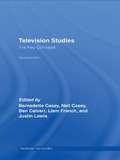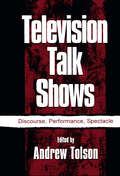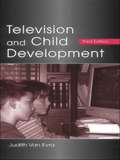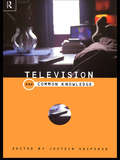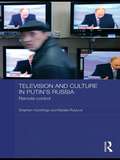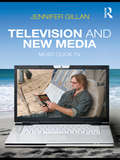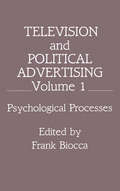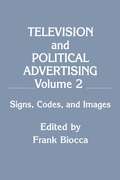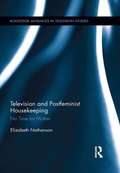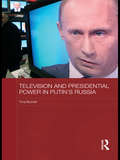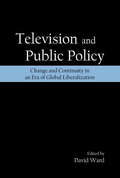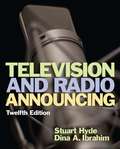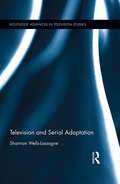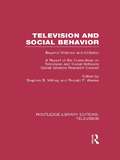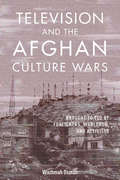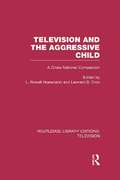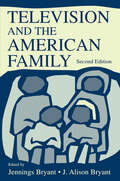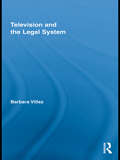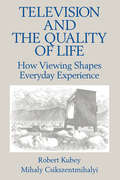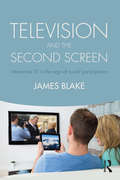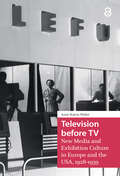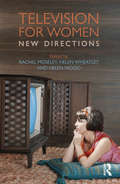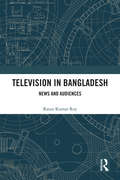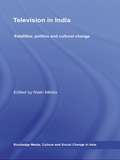- Table View
- List View
Television Studies: The Key Concepts (Routledge Key Guides)
by Justin Lewis Neil Casey Ben Calvert Bernadette Casey Liam FrenchTelevision Studies: The Key Concepts is the definitive reference guide to an area of rapidly expanding academic interest. Among those aspects of television studies covered in this comprehensive and up-to-date guide are: theoretical perspectives which have shaped the study of television - Marxism; semiology; feminism concepts which have shaped the study of television - narrative; representation; bias television genres - soap opera; news; science fiction methods used for understanding television - content analysis; audience research relevant social, economic and political phenomena - ownership; social policy.
Television Style
by Jeremy G. ButlerStyle matters. Television relies on style—setting, lighting, videography, editing, and so on—to set moods, hail viewers, construct meanings, build narratives, sell products, and shape information. Yet, to date, style has been the most understudied aspect of the medium. In this book, Jeremy G. Butler examines the meanings behind television’s stylstic conventions. Television Style dissects how style signifies and what significance it has had in specific television contexts. Using hundreds of frame captures from television programs, Television Style dares to look closely at television. Miami Vice, ER, soap operas, sitcoms, and commercials, among other prototypical television texts, are deconstructed in an attempt to understand how style functions in television. Television Style also assays the state of style during an era of media convergence and the ostensible demise of network television. This book is a much needed introduction to television style, and essential reading at a moment when the medium is undergoing radical transformation, perhaps even a stylistic renaissance. Discover additional examples and resources on the companion website: www.tvstylebook.com.
Television Talk Shows: Discourse, Performance, Spectacle (Routledge Communication Series)
by Andrew TolsonThe "talk show" has become a ubiquitous feature of American and European television. The various examples have been frequently discussed by academic commentators, as well as journalists in an attempt to place them in a cultural setting. Ultimately, the conclusion is reached by both academics and non-academics that talk shows matter because they are a focus for considerable public debate and are crucial to the landscape of popular television. All the variations of talk shows, from chat shows to celebrity interviews, have key elements in common: They all feature groups of guests, not individual interviewees, and they all involve audience participation. The studio audience is not only visible, but is given the opportunity to comment and intervene. Other books have applied academic analysis to the phenomenon of these shows, but this is the first to analyze the actual "talk" of the talk shows, and in that sense it is closer to discourse analysis than to other forms of analysis. This book provides a systematic empirical study of the broadcast talk in talk shows and maps out the range of formats that appear in the major American and British television shows. The contributors are members of an international network of researchers interested in the study of broadcast talk.
Television and Child Development
by Judith Van EvraTelevision continues to play a major role in the lives of most children and adolescents, but current research also reflects the explosive growth in new technologies and their widespread use by young people. Integrating information from communication literature as well as from child development and other psychological domains, author Judith Van Evra presents a summary and synthesis of what is currently known about the media's impact on children's physical, cognitive, social, and emotional development, to help discern the complex and significant interplay between other forces in a child's life and the use of various media. This third edition contains updated and expanded coverage of research findings and a review of changing trends in media use including computers, the Internet, books and magazines, music videos, and video games as well as television. New chapters focus on basic research designs and methodologies; cultural diversity; health-related matters and lifestyle choices; media's impact on various social-emotional aspects of a child's development; the use of technology for information and for entertainment; and intervention possibilities, parent strategies, and education. An overall conclusions section at the end of the book provides a cogent summary of findings to date and stimulates discussion of questions and ideas for future research. Television and Child Development explores how, and to what extent, television and other media actually affect children, and what role other variables may play in mediating their impact, so that we can maximize technology's potential for enriching children's cognitive, social, and emotional development, while at the same time minimizing any negative influence. This text is appropriate for researchers, teachers, and students in communications, developmental and social psychology, and education, as well as in areas of advertising, leisure studies, family studies, and health promotion.
Television and Common Knowledge (Comedia)
by Jostein GripsrudTelevision and Common Knowledge considers how television is and can be a vehicle for well-informed citizenship in a fragmented modern society. Grouped into thematic sections, contributors first examine how common knowledge is assumed and produced across the huge social, cultural and geographical gulfs that characterise modern society, and investigate the role of television as the primary medium for the production and dissemination of knowledge. Later contributions concentrate on specific tv genres such as news, documentary, political discussions, and popular science programmes, considering the changing ways in which they attempt to inform audiences, and how they are actually made meaningful by viewers.
Television and Culture in Putin's Russia: Remote control (BASEES/Routledge Series on Russian and East European Studies)
by Stephen Hutchings Natalia RulyovaThis book examines television culture in Russia under the government of Vladimir Putin. In recent years, the growing influx into Russian television of globally mediated genres and formats has coincided with a decline in media freedom and a ratcheting up of government control over the content style of television programmes. All three national channels (First, Russia, NTV) have fallen victim to Putin’s power-obsessed regime. Journalists critical of his Chechnya policy have been subject to harassment and arrest; programmes courting political controversy, such as Savik Shuster’s Freedom of Speech (Svoboda slova) have been taken off the air; coverage of national holidays like Victory Day has witnessed a return of Soviet-style bombast; and reporting on crises, such as the Beslan tragedy, is severely curtailed. The book demonstrates how broadcasters have been enlisted in support of a transparent effort to install a latter-day version of imperial pride in Russian military achievements at the centre of a national identity project over which, from the depths of the Kremlin, Putin’s government exerts a form of remote control. However, central to the book's argument is the notion that because of the changes wrought upon Russian society after 1985, a blanket return to the totalitarianism of the Soviet media has, notwithstanding the tenor of much western reporting on the issue, not occurred. Despite the fact that television is nominally under state control, that control remains remote and less than wholly effective, as amply demonstrated in the audience research conducted for the book, and in analysis of contradictions at the textual level. Overall, this book provides a fascinating account of the role of television under President Putin, and will be of interest to all those wishing to understand contemporary Russian society.
Television and New Media: Must-Click TV
by Jennifer GillanWe watch TV on computers, phones, and other mobile devices; television is now online as much as it is "on air." Television and New Media introduces readers to the ways that new media technologies have transformed contemporary broadcast television production, scheduling, distribution, and reception practices. Drawing upon recent examples including Lost, 24, and Heroes, this book examines the ways that television programming has changed—transforming nearly every TV series into a franchise, whose on-air, online, and on-mobile elements are created simultaneously and held together through a combination of transmedia marketing and storytelling. Television studios strive to keep their audiences in constant interaction with elements of the show franchise in between airings not only to boost ratings, but also to move viewers through the different divisions of a media conglomerate. Organized around key industrial terms—platforming, networking, tracking, timeshifting, placeshifting, schedule-shifting, micro-segmenting, and channel branding this book is essential for understanding how creative and industrial forces have worked together to transform the way we watch TV.
Television and Political Advertising: Volume I: Psychological Processes (Routledge Communication Series)
by Frank BioccaThis volume represents one of the first major scholarly effort to unravel the psychological and symbolic processing of political advertising. Utilizing survey, experimental, qualitative, and semiotic methodologies to study this phenomenon, the contributors to Television and Political Advertising trace how political ads help to interpret the psychological reality of the presidential campaign in the minds of millions of voters. A product of the National Political Advertising Research Project, this interdisciplinary effort is valuable to researchers in advertising, communication, and consumer psychology since it helps define future work on the relationship between television, politics, and the mind of the voter. This volume, Television and Political Advertising: Psychological Processes, is the first of two, and covers such topics as Models and Theories for Viewing Political Television; Psychological Processing of Issues, Images, and Form; Differential Processing of Positive and Negative Advertising; and The Psychological Contexts of Processing.
Television and Political Advertising: Volume Ii: Signs, Codes, and Images (Routledge Communication Series)
by Frank BioccaThis volume represents one of the first major scholarly efforts to unravel the psychological and symbolic processing of political advertising. Utilizing survey, experimental, qualitative, and semiotic methodologies to study this phenomenon, the contributors to Television and Political Advertising trace how political ads help to interpret the psychological reality of the presidential campaign in the minds of millions of voters. A product of the National Political Advertising Research Project, this interdisciplinary effort is valuable to researchers in advertising, communication, and consumer psychology since it helps define future work on the relationship between television, politics, and the mind of the voter. This volume, Television and Political Advertising: Signs, Codes and Images, is the second of two, and covers such areas as Generating Meaning in the Pursuit of Power, Analyses of the Meaning of Political Ads, The Campaign Documentary as an Ad, and Regulating Signs and Images.
Television and Postfeminist Housekeeping: No Time for Mother (Routledge Advances in Television Studies #3)
by Elizabeth NathansonIn this book, Nathanson examines how contemporary American television and associated digital media depict women’s everyday lives as homemakers, career women, and mothers. Her focus on American popular culture from the 1990s through the present reveals two extremes: narratives about women who cannot keep house and narratives about women who only keep house. Nathanson looks specifically at the issue of time in this context and argues that the media constructs panics about domestic time scarcity while at the same time offering solutions for those very panics. Analyzing TV programs such as How Clean is Your House, Up All Night, and Supernanny, she finds that media’s portrayals of women’s time is crucial to understanding definitions of femininity, women’s labor, and leisure in the postfeminist context.
Television and Presidential Power in Putin's Russia (BASEES/Routledge Series on Russian and East European Studies)
by Tina BurrettAs a new president takes power in Russia, this book provides an analysis of the changing relationship between control of Russian television media and presidential power during the tenure of President Vladimir Putin. It argues that the conflicts within Russia’s political and economic elites, and President Putin’s attempts to rebuild the Russian state after its fragmentation during the Yeltsin administration, are the most significant causes of changes in Russian media. Tina Burrett demonstrates that President Putin sought to increase state control over television as part of a larger programme aimed at strengthening the power of the state and the position of the presidency at its apex, and that such control over the media was instrumental to the success of the president’s wider systemic changes that have redefined the Russian polity. The book also highlights the ways in which oligarchic media owners in Russia used television for their own political purposes, and that media manipulation was not the exclusive preserve of the Kremlin, but a common pattern of behaviour in elite struggles in the post-Soviet era. Basing its analysis predominately on interviews with key players in the Moscow media and political elites, and on secondary sources drawn from the Russian and Western media, the book examines broad themes that have been the subject of constant media interest, and have relevance beyond the confines of Russian politics.
Television and Public Policy: Change and Continuity in an Era of Global Liberalization
by David WardThe significant changes that have swept the television industry over the last two decades, most notably a shift to deregulation in broadcast media, prompt a discussion on how to ensure that meaningful content is available to the viewer. Television and Public Policy analyzes the current state of television systems in a selected group of countries by exploring the political, economic, and technological factors that have shaped the sector in such a short span of time. Consequently, by positioning the television sector within issues of media policy and the regulatory framework, the book questions what these trends mean for television, and the historical, political, and cultural role in our societies. Television and Public Policy distinguishes itself in several ways:*It is a global project in its comparative scope and subject area. Contributors represent countries including Australia, Brazil, Canada, China, Egypt, India, Iran, Ireland, Israel, Italy, Japan, the Netherlands, New Zealand, Poland, the United Kingdom, and the United States.*It is contemporary and filled with information largely absent in current literature.*It offers original analysis of the contemporary television sector. This book speaks to a broad range of academics, postgraduate, and undergraduate students, and can serve as a key resource for courses ranging from media studies, to development studies, international relations, and law.
Television and Radio Announcing, Twelfth Edition
by Stuart Hyde Dina A. IbrahimThe digital revolution has significantly changed broadcast technology. The 12th edition of Television and Radio Announcing reflects new trends in the field, such as the reconfiguration of electronic media production practices and distribution models. The internet and social media have opened up new access to production and new methods of distribution, such as YouTube, Facebook, Twitter, and podcasts. The 12th edition addresses the realities of students who live in this new era.
Television and Serial Adaptation (Routledge Advances in Television Studies)
by Shannon Wells-LassagneAs American television continues to garner considerable esteem, rivalling the seventh art in its "cinematic" aesthetics and the complexity of its narratives, one aspect of its development has been relatively unexamined. While film has long acknowledged its tendency to adapt, an ability that contributed to its status as narrative art (capable of translating canonical texts onto the screen), television adaptations have seemingly been relegated to the miniseries or classic serial. From remakes and reboots to transmedia storytelling, loose adaptations or adaptations which last but a single episode, the recycling of pre-existing narrative is a practice that is just as common in television as in film, and this text seeks to rectify that oversight, examining series from M*A*S*H to Game of Thrones, Pride and Prejudice to Castle.
Television and Social Behavior: Beyond Violence and Children / A Report of the Committee on Television and Social Behavior, Social Science Research Council (Routledge Library Editions: Television)
by Stephen B. Withey and Ronald P. AbelesThis book, published originally in 1980, addressed the needs for a profile of televised violence which considered the advantages and disadvantages of various measures and for a furthering of research directions beyond the then-popular emphasis on children. The Committee on Television and Social Behavior was formed in1972 and stimulated new research in order to provide a multidimensional profile of the social effects of television programming. Chapters here look at the effect of television on adults as well as children, particularly special audiences such as the elderly and minority groups. An excellent summary of the various conceptual, substantive and methodological issues around television’s influence.
Television and the Afghan Culture Wars: Brought to You by Foreigners, Warlords, and Activists (The Geopolitics of Information #12)
by Wazhmah OsmanPortrayed in Western discourse as tribal and traditional, Afghans have in fact intensely debated women's rights, democracy, modernity, and Islam as part of their nation building in the post-9/11 era. Wazhmah Osman places television at the heart of these public and politically charged clashes while revealing how the medium also provides war-weary Afghans with a semblance of open discussion and healing. After four decades of gender and sectarian violence, she argues, the internationally funded media sector has the potential to bring about justice, national integration, and peace. Fieldwork from across Afghanistan allowed Osman to record the voices of many Afghan media producers and people. Afghans offer their own seldom-heard views on the country's cultural progress and belief systems, their understandings of themselves, and the role of international interventions. Osman analyzes the impact of transnational media and foreign funding while keeping the focus on local cultural contestations, productions, and social movements. As a result, she redirects the global dialogue about Afghanistan to Afghans and challenges top-down narratives of humanitarian development.
Television and the Aggressive Child: A Cross-national Comparison (Routledge Library Editions: Television)
by L. Rowell Huesmann and Leonard D. EronThe research presented in this book, originally published in 1986, looks to pinpoint the psychological processes involved in the media violence-aggression relation. Expanding on earlier studies, the compilation of essays here delves deeply into aggression study and compares results about media influence across 5 countries. Cultural norms and programming differences are investigated as well as age and gender and other factors. What is offered overall is a psychological model in which TV violence is both a precursor and a consequence of aggression.
Television and the American Family
by J. Alison BryantThis second edition of a trend-setting volume provides an updated examination of the interaction between families and the most pervasive mass medium: television. Charting the dynamic developments of the American family and television over the past decade, this volume provides a comprehensive representation of programmatic research into family and television and examines extensively the uses families make of television, how extensions of television affect usage, families' evolving attitudes toward television, the ways families have been and are portrayed on television, the effects television has on families, and the ways in which families can mediate its impact on their lives. The volume is an invaluable resource for scholars and students in the areas of media and society, children and media, and family studies.
Television and the Legal System (Routledge Studies in Law, Society and Popular Culture)
by Barbara VillezThis book examines the American television legal series from its development as a genre in the 1940s to the present day. Villez demonstrates how the genre has been a rich source of legal information and understanding for Americans. These series have both informed and put myths in place about the legal system in the US. Villez also contrasts the US to France, which has seen a similar interest in legal series during this period. However, French television representations of justice are strikingly different, as is the role of fiction in offering viewers the possibility of acquiring significant understandings of their legal system. The book will be an important addition to the study of popular culture and law and will interest legal scholars, sociologists, and media scholars.
Television and the Quality of Life: How Viewing Shapes Everyday Experience (Routledge Communication Series)
by Robert Kubey Mihalyi CsikszentmihalyiEmploying a unique research methodology that enables people to report on their normal activities as they occur, the authors examine how people actually use and experience television -- and how television viewing both contributes to and detracts from the quality of everyday life. Studied within the natural context of everyday living, and drawing comparisons between television viewing and a variety of other daily activities and leisure pursuits, this unusual book explores whether television is a boon or a detriment to family life; how people feel and think before, during, and after television viewing; what causes television habits to develop; and what causes heavy viewing -- and what heavy viewing causes -- in the short and long term. Television and the Quality of Life also compares the viewing experience cross-nationally using samples from the United States, Italy, Canada, and Germany -- and then interprets the findings within a broad theoretical and historical framework that considers how information use and daily activity contribute to individual, familial, societal, and cultural development.
Television and the Second Screen: Interactive TV in the age of social participation
by James BlakeTelevision is changing almost beyond recognition. In the battle for consumers, social media sites, smart phones and tablets have become rivals to traditional linear TV. However, audiences and producers are also embracing mobile platforms to enhance TV viewing itself. This book examines the emerging phenomenon of the second screen: where users are increasingly engaging with content on two screens concurrently. The practice is transforming television into an interactive, participatory and social experience. James Blake examines interactive television from three crucial angles: audience motivation and agency, advances in TV production and the monetisation of second screen content. He also tracks its evolution by bringing together interviews with more than 25 television industry professionals - across the major UK channels - including commissioning editors, digital directors, producers and advertising executives. These reveal the successes and failures of recent experiments and the innovations in second screen projects. As the second screen becomes second nature for viewers and producers, the risks and opportunities for the future of television are slowly beginning to emerge. Television and the Second Screen will offer students and scholars of television theory, industry professionals and anyone with an abiding interest in television and technology, an accessible and illuminating guide to this important cultural shift.
Television before TV: New Media and Exhibition Culture in Europe and the USA, 1928-1939 (Televisual Culture)
by Anne-Katrin WeberTelevision before TV rethinks the history of interwar television by exploring the medium’s numerous demonstrations organized at national fairs and international exhibitions in the late 1920s and 1930s. Building upon extensive archival research in Britain, Germany, and the United States, Anne-Katrin Weber analyses the sites where the new medium met its first audiences. She argues that public displays offered spaces where television's symbolic, cultural, political, and social definitions were negotiated and eventually stabilized; for the historian, the exhibitions therefore constitute crucial events to understand not only the medium's pre-war emergence, but also its subsequent domestication in the post-war years. Designed as a transnational study, her book highlights the multiple circulations of artefacts and ideas across borders of democratic and totalitarian regimes alike. Richly illustrated with 100 photographs, Television before TV finally emphasizes that even without regular programmes, interwar television was widely seen.
Television for Women: New Directions
by Helen Wheatley Rachel Moseley Helen WoodTelevision for Women brings together emerging and established scholars to reconsider the question of ‘television for women’. In the context of the 2000s, when the potential meanings of both terms have expanded and changed so significantly, in what ways might the concept of programming, addressed explicitly to a group identified by gender still matter? The essays in this collection take the existing scholarship in this field in significant new directions. They expand its reach in terms of territory (looking beyond, for example, the paradigmatic Anglo-American axis) and also historical span. Additionally, whilst the influential methodological formation of production, text and audience is still visible here, the new research in Television for Women frequently reconfigures that relationship. The topics included here are far-reaching; from television as material culture at the British exhibition in the first half of the twentieth century, women’s roles in television production past and present, to popular 1960s television such as The Liver Birds and, in the twenty-first century, highly successful programmes including Orange is the New Black, Call the Midwife, One Born Every Minute and Wanted Down Under. This book presents ground-breaking research on historical and contemporary relationships between women and television around the world and is an ideal resource for students of television, media and gender studies.
Television in Bangladesh: News and Audiences
by Ratan Kumar RoyThis book examines the role of 24/7 television news channels in Bangladesh. By using a multi-sited ethnography of television news media, it showcases the socio-political undercurrents of media practices and the everydayness of TV news in Bangladesh. It discusses a wide gamut of issues such as news making; localised public sphere; audience reaction and viewing culture; impact of rumours and fake news; socio-political conditions; protest mobilization; newsroom politics and perspectives from the ground. An important intervention in the subject, this book will be useful to scholars and researchers of media studies, journalism and mass communication, anthropology, cultural studies, political sociology, political science, sociology, South Asian studies, as well as television professionals, journalists, civil society activists, and those interested in the study of Bangladesh.
Television in India: Satellites, Politics and Cultural Change (Media, Culture and Social Change in Asia)
by Nalin MehtaThis book examines the development of television in India since the early 1990s, and its implications for Indian society more widely. Until 1991, India possessed only a single state-owned television channel, but since then there has been a rapid expansion in independent satellite channels which came as a complete break from the statist control of the past. This book explores this transformation, explaining how television, a medium that developed in the industrial West, was adapted to suit Indian conditions, and in turn has altered Indian social practices, making possible new ways of imagining identities, conducting politics and engaging with the state. In particular, satellite television initially came to India as the representative of global capitalism but it was appropriated by Indian entrepreneurs and producers who Indianized it. Considering the full gamut of Indian television - from "national" networks in English and Hindi to the state of regional language networks – this book elucidates the transformative impact of television on a range of important social practices, including politics and democracy, sport and identity formation, cinema and popular culture. Overall, it shows how the story of television in India is also the story of India's encounter with the forces of globalisation.
